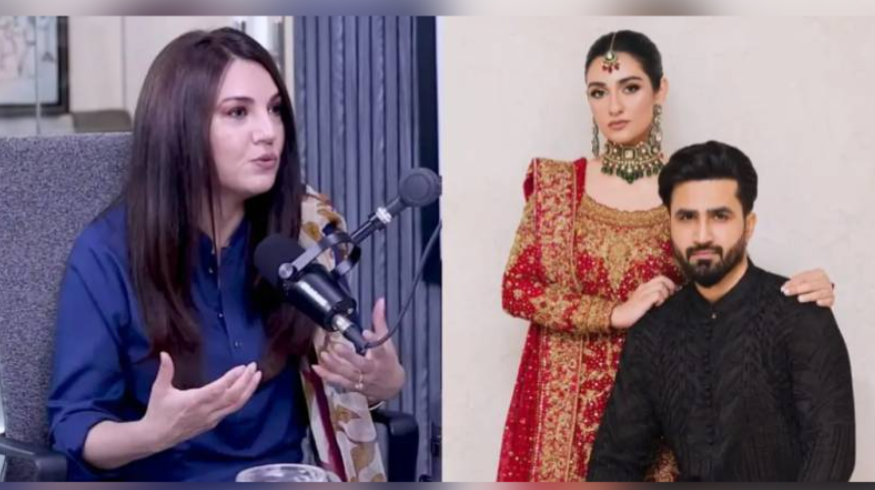Table of Contents
ToggleReham Khan Takes Swipe at Sarah Khan Over Anti-Feminist Remarks

In the ever-vibrant landscape of Pakistani celebrity culture, public figures often find themselves at the center of intense social and political debates. Reham Khan, known for her outspoken views on women’s rights and social issues, has recently ignited a fresh controversy by criticizing actress Sarah Khan for making what Reham calls “regressive and anti-feminist” remarks.
The debate has caught fire across social media, drawing reactions from fans, activists, and fellow celebrities. As the conversation deepens, it offers a critical lens into the dynamics of feminism in Pakistani entertainment and the responsibilities that come with fame.
The Controversy Unfolds
The controversy began when Sarah Khan, during a televised interview, was asked about her views on women’s empowerment. Her response, which included the statement that “a woman’s real strength is in obedience and silence”, raised eyebrows across various quarters of society. While her fans tried to interpret her comments in a cultural or personal context, others felt that her remarks were dismissive of the years of struggle by women’s rights activists.

It didn’t take long for Reham Khan to respond. A staunch feminist and social commentator, Reham took to social media to voice her disapproval. In a tweet that quickly went viral, Reham said:
“It’s disappointing when women in positions of influence echo the very sentiments that have oppressed generations of women. Feminism isn’t a trend; it’s a necessity.”
Reham Khan’s Feminist Stance
Reham Khan has long been known for her commitment to gender equality. As a journalist, author, and former First Lady of Khyber Pakhtunkhwa, she has used her platform to highlight issues such as domestic violence, workplace discrimination, and gender pay gaps in Pakistan.
In her memoir, Reham openly discussed the societal expectations placed upon women and the personal challenges she faced while trying to break free from traditional molds. Her public persona reflects a constant battle against patriarchal norms — a stance that makes her criticism of Sarah Khan particularly impactful.
According to Reham Khan, silence is not a virtue in a world where women are still fighting for their basic rights. Her critique wasn’t just about one celebrity’s opinion; it was about what that opinion represents in a broader cultural context.
The Celebrity Influence
In today’s digital age, celebrities hold unparalleled sway over public opinion. That’s why Reham Khan believes it is crucial for public figures to be mindful of the impact their words can have on impressionable audiences.

Reham stated, “Celebrities must understand the power they wield. When you dismiss feminism as unnecessary or label strong women as problematic, you send a damaging message to young girls who look up to you.”
Her concern revolves around the normalization of gender stereotypes, especially when perpetuated by women in the limelight. According to Reham, it’s not just about freedom of speech — it’s about the social responsibility that comes with being a role model.
Social Media Reactions
The incident has divided the internet. Hashtags like #RehamKhan and #SarahKhan have been trending on Twitter and Instagram, with thousands weighing in on both sides of the argument.
Supporters of Reham Khan have praised her for standing up against what they see as regressive thinking. One user wrote, “Thank you Reham Khan for speaking up. We need more women like you who dare to challenge toxic narratives.”
Meanwhile, Sarah Khan’s supporters defended her right to personal opinion, claiming that she was merely expressing her beliefs shaped by her own upbringing and experiences. However, many remained neutral, calling for a more respectful dialogue rather than public shaming.
Feminism in Pakistan: A Divided House?
Reham Khan’s remarks touch on a deeper societal issue — the fragmented understanding of feminism in Pakistan. For some, feminism is synonymous with Western ideals and is often rejected for being culturally irrelevant. For others, it represents the only viable path toward justice and equity in a male-dominated society.
Reham has consistently argued for a culturally rooted feminism — one that acknowledges local traditions while fighting injustice. She believes that Pakistan doesn’t need imported slogans but homegrown solutions that empower women within their own social and religious frameworks.
The Way Forward: Dialogue Over Division
Despite the heated exchange, Reham Khan later clarified that her intention was not to vilify Sarah Khan but to spark a meaningful conversation. In a follow-up interview, she said:
“We can disagree without disrespect. But we must challenge opinions that risk setting us back by decades.”
She emphasized the importance of dialogue and education in changing mindsets and called on the media industry to create more space for informed debates on women’s issues.
Reham also urged educational institutions, influencers, and families to teach young girls the value of self-worth and independence, stressing that no woman should be conditioned to accept subservience as her fate.
Reham Khan’s Role in Shaping the Narrative
In many ways, Reham Khan has become a voice for progressive thought in Pakistan’s media and political discourse. Her courage in speaking out, even against fellow celebrities, underscores her commitment to fostering a more just and equal society.
Her confrontation with Sarah Khan may be seen by some as controversial, but it also reflects her unwavering dedication to truth and social reform. Whether one agrees with her or not, Reham Khan continues to play a vital role in challenging outdated norms and sparking conversations that matter.
Conclusion
This clash between Reham Khan and Sarah Khan has highlighted a larger debate within Pakistani society: the struggle between tradition and transformation. While both women are entitled to their perspectives, the incident underscores the importance of responsible speech, especially from those in the public eye.

At its core, Reham Khan’s critique is not just about feminism or celebrity culture — it’s about the future we envision for Pakistani women. Do we want a future where silence is seen as strength, or one where voices are raised for justice, equality, and progress?
As the conversation continues, one thing is clear: Reham Khan remains a powerful force in shaping that future, one bold statement at a time.
